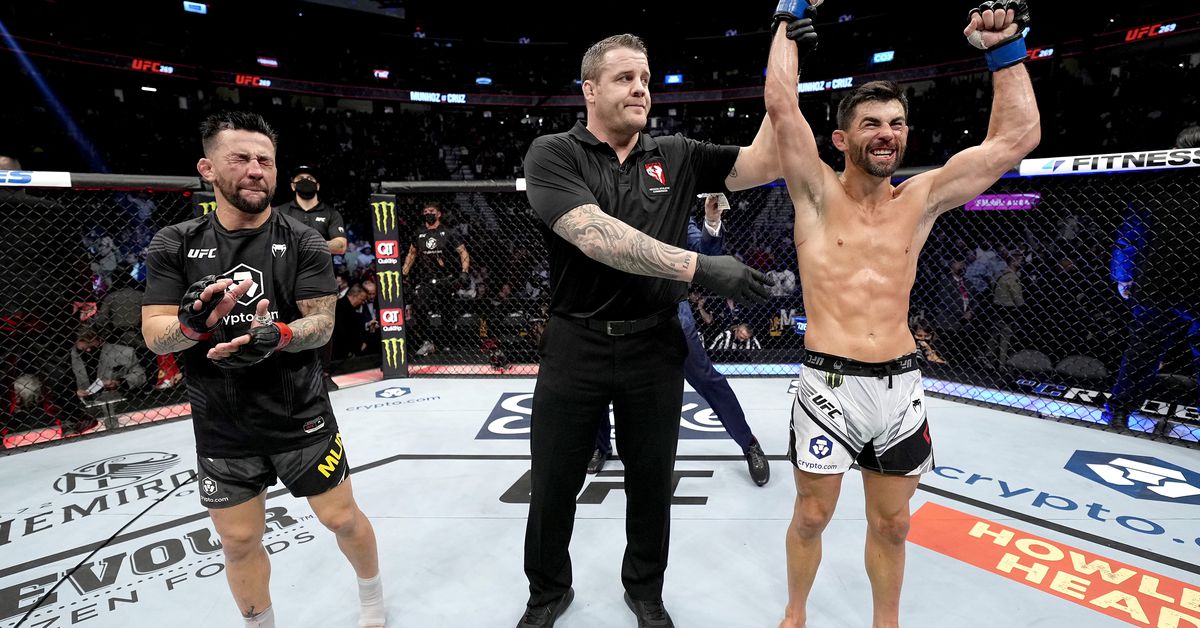In fights where judges make the wrong call, former UFC bantamweight champ Dominick Cruz believes it should be as easy as rebooking the fight.
To go along with that, he added, the losing fighter shouldn’t have to worry about taking home half their potential payday – show and win purses should be replaced by a flat appearance fee.
That is Cruz’s partial fix for the ever-present woes of MMA judging and the consequences they create for the fans and fighters. Limit the judges’ ability to harm the fighters, and you’re addressing the real issue they face: losing money.
“What are we complaining about? We’re complaining about the pay of the athlete when they lose according to bad judging,” Cruz said recently on The MMA Hour. “So how do we get that out of the equation? I think you can start advocating for flat fees instead of win/show bonuses.
“Holly Holm lost half her money. How many times has [UFC President] Dana White given someone who has lost their win and show money. Why can’t we just make that a normal thing so the commission has no power over ruining our careers with their bad decisions and their lack of knowledge, if that’s what it is that’s going on? If the commission messes up, you just book a rematch. Nobody loses.”
Cruz doesn’t see the value in changing the system to incorporate open scoring, where fans and fighters would know how they were being evaluated between rounds. The way he sees it, that won’t matter much in the middle of a fight.
“Let’s say I know their incompetent for three rounds, and now I have two rounds of incompetent judges,” he said. “How am I going to get them to be competent the last two rounds just because I’m punching harder or shooting more?”
In a perfect world, he said the best solution is a set of competent judges who know the sport inside and out. That’s not the current state of affairs, he believes.
“To me, you can redo the system as many times as you want, but it’s still the same players in the system,” Cruz said. “When you look at open scoring, who’s choosing in each state the judges and the referees? That would be the commissioner of each state. So what makes the commissioner know MMA so well that he can choose these people? Who choose that person, and how did he get there to choose what’s best for us as athletes. How does he know?
“We know from years and years of boxing, it’s just trickling in from boxing. So what relationships have been built in boxing are coming over to MMA, which is OK. It’s what we have. But it’s not the root issue. The root issue is how do we get educated? … Do they do a grounding and debrief after every event on the things that went well and the things that went bad?”
The short answer is yes for many commissions, including the Nevada Athletic Commission, which regulates the UFC APEX events Cruz regularly commentates. The executive director regularly meets afterward with referees and judges and reviews the calls and decisions that were made. In many cases, it is the trigger for continuing education for judges who may too often be in the minority.
Cruz will be in attendance for a seminar on MMA officiating featuring several working judges and referees. The goal is to get everyone on the same page about how the process works and hopefully eliminate the confusion and second-guessing that often accompanies a close decision, such as in Holm’s split-call loss to Ketlen Vieira in the headliner of UFC Vegas 55 earlier this month.
Several of the most used judges are experienced martial artists with direct backgrounds in jiu-jitsu, boxing, and MMA. Cruz remains skeptical, however, about the whole system, and believes their impact should be minimized.
“The commissions set up a meeting for us announcers on the scoring system,” Cruz said. “Well, who’s setting up the meeting for the commissioner on what a takedown is? Who’s setting up a meeting for the commissioner on choosing people that know what a takedown is? That know what it feels like to get hit with a calf kick compared to a high kick? In my era, calf kicks didn’t exist other than Benson Henderson. Now it’s one of the most used techniques in the sport. I’ve had to feel that feeling to know you’ve got about three to five of those kicks before the muscle and the nerve pretty much shuts down.
“How many of these judges know that, know that feeling, know that after you get taken down five times by Khabib, [on] No. 7, even though he didn’t do any damage, it took seven takedowns to get that dude down. How tired is that guy? They’ve never been in that position. They don’t know how miserable that is. … It just comes down to education.”


